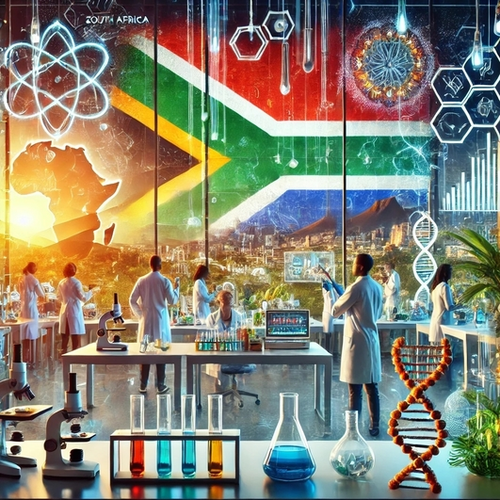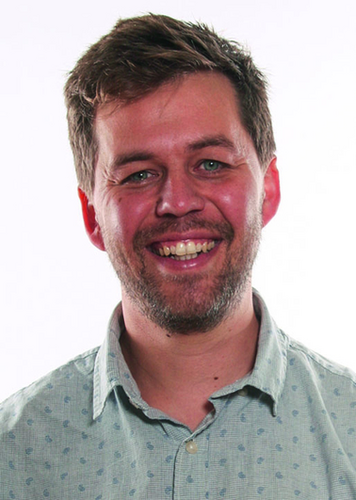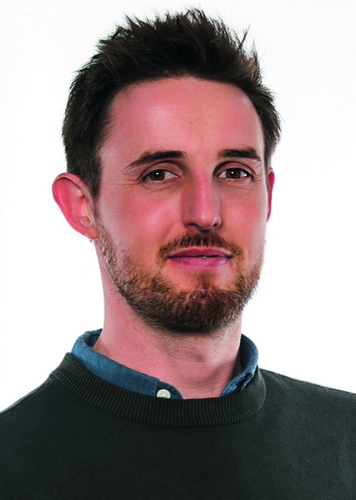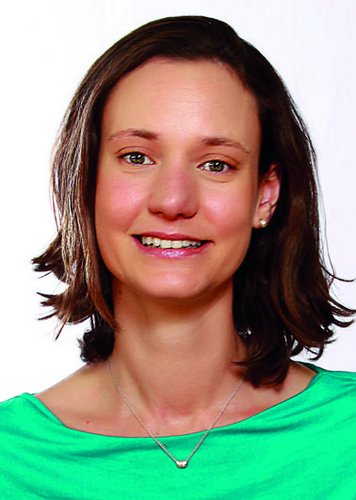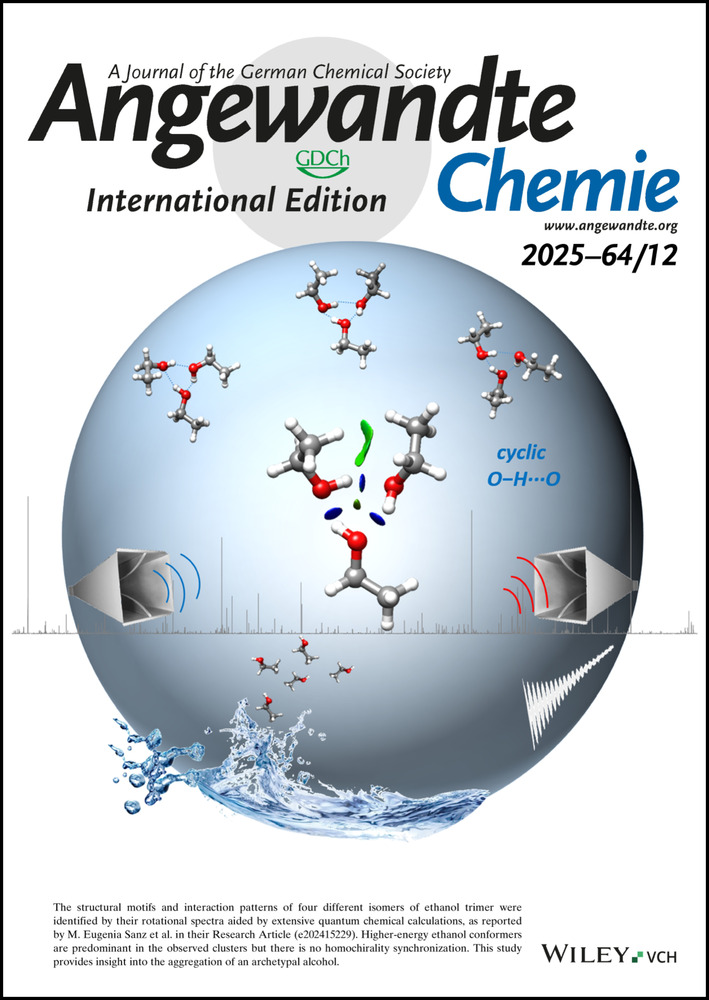Chemistry as a Catalyst for Transforming the Health and Wealth of South Africa
Graphical Abstract
South Africa's rich natural resources fuelled its industrialisation but are marred by its colonial past. Despite 30 years of democracy, deep inequalities remain, with infectious diseases disproportionately affecting disadvantaged communities. Chemistry and biomedical research can help to address these challenges. This Viewpoint advocates for chemistry-driven advancements tailored to South Africa's socioeconomic needs to improve healthcare and economic outcomes.
Abstract
South Africa's rich natural resources remain a key driver of its chemical industrialisation but are tainted and constrained by its complex colonial history. Thirty years since the advent of democracy in South Africa, deep sociopolitical inequalities are amplified by an intolerable infectious disease burden amongst disadvantaged communities. In that respect, South Africa shares challenges with many other nations in the Global South; there are limited opportunities for the economic development and growth needed to uplift all strata of society. This Viewpoint examines the role of the chemical sciences in South Africa's unique history and the current state of its academic and industrial sectors, with a focus on the intersection of chemistry, healthcare and biomedical research. We argue that the opportunities offered through chemistry research and development, including local manufacturing, should be exploited and that scientific advancements should be tailored to and integrated with the socioeconomic realities of South Africa for an effective and multidisciplinary approach to improving healthcare outcomes. This Viewpoint aims to inspire a renewed focus on the pivotal role of chemical scientists and their broader societal contributions to combating the country's infectious disease burden and shaping a healthier future for South Africa.
Chemistry as a Driver for a Better Society; South Africa's Unique Context
Over the course of human history, insights into the nature and interactions of atoms and molecules have transformed chemistry into an enabling discipline in which physical and biological phenomena can be harnessed to expand our control over the natural world.1, 2 Through progressively more innovative and efficient methods of synthesising and characterising complex substances,3 chemistry has facilitated an explosion of scientific innovation enhancing numerous aspects of modern society including agriculture, communication, energy provision, water security and health.4-7
Translating these discoveries into tangible benefits for all sectors of society has necessitated the large-scale production of chemical materials through the global industrial manufacturing pipeline.6 But the biggest impact of chemistry on society has likely been in the arena of human health. Global pharmaceutical research and development (R&D), for example, attracts vast quantities of funds, provides significant well-paid employment opportunities and is one of the more successful avenues for retaining collaborative links between universities and industry.8, 9 This has resulted in the provision of hundreds of chemotherapeutic options for neurological disease, pain relief, family planning and non-communicable diseases such as hypertension, diabetes and cancer. Small molecules have also been exploited to support advanced medical interventions such as anaesthetics, neuromuscular blockers and medical bioimaging.10, 11
In addition, chemistry plays a key role in the treatment of infectious disease through the development of small molecule therapeutics. As well as providing a safety net for lifesaving surgical procedures, the introduction of antimicrobial agents into the clinic, spanning medicines for fungal, tubercular, parasitic and viral pathogens, has coincided with a dramatic and sustained increase in average life-expectancy across the globe.11-13 In addition to R&D, the supply of both innovative and generic medicines requires a large manufacturing and export component. Nations which have prioritised investment in pharmaceutical R&D, in addition to the industrial manufacture of active pharmaceutical ingredients (APIs), have found it to form a cornerstone of economic growth and sustainability14-19 while providing secure and equitable access to medicines.20 Accordingly, chemistry innovation and productivity, combined with the movement towards a green and circular economy, is crucial to sustainable global development.21-23 However, these societal advancements are not felt evenly throughout the world; currently, they disproportionately benefit the Global North.1
Africa's enormous disease burden, coupled with rapid urbanisation, population expansion and lifestyle alterations, has seen a significant increase in demand for medicines for both infectious and non-communicable diseases.24, 25 This issue is amplified by the lack of a suitable pipeline of medicines to combat drug resistance and re-emerging diseases.26, 27 Furthermore, biomedical data, including genomic and clinical trial data, which are critical in the study (and ultimately the clinical management) of disease, have traditionally not been suitably representative of Africa.28 This factor, combined with the genetic diversity found on the continent,29 is intimately linked to the variable response to drug therapies commonly observed in African populations.30 Accordingly, the shift toward scientific self-reliance and innovation also requires the amplification of efforts to increase African representation in all stages biomedical research.31
Post-apartheid South Africa is grappling with significant sociopolitical inequalities characterised by uneven access to quality health, education, housing and employment.32, 33 This includes a substantial non-communicable and infectious disease burden. To this end, South Africa may represent a microcosm of experiences faced in many other parts of the Global South,33 not only with respect to diversity and inclusion, but also opportunities for development and growth. In this Viewpoint, we highlight the contributions of chemistry to the biomedical sciences and infectious disease research in post-apartheid South Africa from both academia and industry, identifying successes and challenges, and proposing interventions that will benefit all members of South African society.
The Indispensable Role of Higher Education Institutions in South Africa's Chemistry Landscape
South African universities play a significant role in research innovation, skills transfer and incentivising synergistic collaborative projects that can increase investments in academic research.34 Many universities, especially historically-disadvantaged institutions (HDIs), still have limited infrastructure and a scarcity of skills, resources and capacity to pursue globally-competitive research. Accordingly, significant investment is required in both human capital development and research infrastructure at HDIs to support the development of research capacity and to better reflect the ethnic and gender diversity of South African society at all institutions.
Encouragingly, national strategies, interventions and incentives for universities have demonstrated some positive outcomes. The South African Research Chairs Initiative (SARChI), led by the then Department of Science and Technology (DST, now the Department of Science and Innovation, DSI) and the South African National Research Foundation (NRF), was designed to support South Africa's emergence as an internationally competitive global knowledge economy in a way that was relevant to national development. The introduction of graduate-based subsidies from the state has seen the average number of doctorates per million people increase from 21 in 2000 to 49 in 2015.35 Despite relatively limited investment in research and capacity, South Africa's performance is disproportionately excellent, with the output of articles per million population from South African researchers comparing favourably to comparator countries including Brazil, Argentina, Mexico and India. Indeed, South Africa's citation impact has been above the world average for the past decade, with a mean normalised citation score of 1.29 for the period between 2021 and 2023. In 2015, 35 % of PhD graduates in South Africa were from the natural and health sciences, while international collaboration in these fields increased from 39 % in 2000 to 62 %–66 % in 2016.35 However, these positive trends are under threat from the increasing financial strain experienced by South African universities linked to a pernicious decline in local funding for research running costs and scholarships for postgraduate and postdoctoral researchers.36 Worryingly, following cuts to its government funding allocation, the NRF expects to fund 1 000 fewer researchers in the 2024–2025 financial year.36
Research centres and institutions with core facilities play a large role in delivering impactful health-related research outputs in South Africa. Notable centres include the Institute of Infectious Disease and Molecular Medicine (IDM) at the University of Cape Town (UCT, Figure 1).37 The IDM is a trans-faculty research institute which boasts state-of-the-art facilities tackling African-relevant diseases, including tuberculosis (TB), HIV and other parasitic, viral and bacterial infections, as well as non-communicable diseases. Other thriving health research centres in South Africa include the Africa Health Research Institute (AHRI)38 which supports around 700 scientists, students and staff members, the mRNA Technology Transfer Programme (led collaboratively by Afrigen, the Biovac Institute and the South African Medical Research Council, SAMRC)39 and the recently-established Stellenbosch Biomedical Research Institute (BMRI).40 The interdisciplinary and translational nature of the work done by these institutes is helping to promote collaborative research, innovation and sustainability for managing future health burdens on the continent. Indeed, the impact of Covid-19 on the health of South Africans and the country's economy has recently highlighted the importance of pandemic preparedness, scientific research and South Africa's unique set of skills and experiences when it comes to dealing with health burdens.
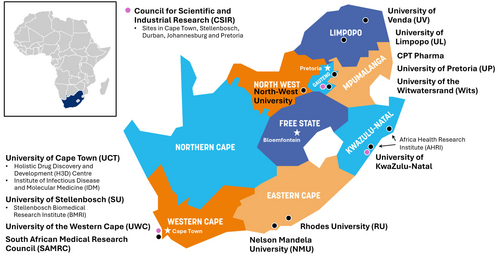
A map of South Africa, showing its nine provinces and the geographical locations of the biomedical research and higher education institutions listed in this article.
Since its launch in 2010, the Holistic Drug Discovery and Development (H3D) Centre at UCT has made significant advances in innovative drug discovery projects and infrastructure development, intimately aligned with capacity strengthening across the African continent.41 This includes the discovery of the first ever small-molecule clinical candidate (MMV390048) for any disease, researched on African soil.42-44 H3D has grown to over 70 scientists, almost all of whom hold postgraduate degrees, and has established technology platforms in chemistry, infectious disease biology and drug metabolism and pharmacokinetics. It has initiated infectious disease drug discovery programmes in malaria, TB and antibiotic-resistant microbial diseases. Working with innovative pharmaceutical companies and philanthropic organisations such as the Gates Foundation has provided strong support for global health projects, including access to two Gates Foundation-supported consortia, the Tuberculosis Drug Accelerator (TBDA)45 and the Malaria Drug Accelerator (MalDA).46
More recently, the H3D Foundation was founded as a non-profit company in 2019 and was incorporated as the vehicle for driving drug discovery capacity-building projects and continuing the work initiated by the H3D Centre. The vision for the H3D Foundation is to enable and unlock the potential for sustainable drug discovery and development across Africa, such as through the Grand Challenges African Drug Discovery Accelerator (GC ADDA) programme,47 which will complement and strengthen existing medicinal chemistry research initiatives across the continent.42, 48 H3D has also established productive relationships with HDIs such as the University of Limpopo and the University of Venda to help level the playing fields and build capacity across the country.49 These particular projects, which are beneficiaries of the South African Government's Strategic Health Innovation Partnerships (SHIP) unit of the SAMRC, focus on the synthesis of novel compounds active against Mycobacterium tuberculosis, with support from H3D in the form of training, mentoring and access to infrastructure. Since chemists play a crucial role in drug discovery, building this local capacity is helping African scientists to become self-sustainable and independent which is, in turn, driving funding for research and job creation that will lead to the critical mass of scientific skills needed in South Africa.
In addition to drug discovery underpinned by medicinal chemistry, developments in nanotechnology and organometallic chemistry in South Africa are significantly enhancing the country's scientific landscape by driving innovations in healthcare, energy and materials science. In healthcare, these fields are paving the way for more targeted and effective treatments, such as nanomedicines for drug delivery systems that can precisely target diseased cells, reducing side effects and improving patient outcomes.50-52 Organometallic compounds are being explored for their potential in developing new anticancer agents and as catalysts for chemical reactions critical to drug synthesis.53, 54 These advancements are particularly important as a means of extracting additional value out of South Africa's natural resources and contributing to the country's economic development by fostering high-tech industries.
The Contributions of Industry to South Africa's Chemistry Research Enterprise
Historically, the petrochemical company Sasol has been a driving force in the South African chemical industry. This includes stimulating collaborative research projects with universities in fields such as catalysis, sustainable energy and materials science.55, 56 Beyond higher education institutions, most chemistry innovation relevant to healthcare is conducted by the Council for Scientific and Industrial Research (CSIR) and the SAMRC. Pharmaceutical manufacture in South Africa, on the other hand, is almost entirely dominated by the formulation stage of the supply chain, with very little activity in the manufacture of APIs.57 Therefore, South Africa's pharmaceutical industry is almost wholly reliant on API imports.58 In addition to impacting supply security, this also negatively influences costs, with prices of medicines in South Africa markedly higher than the cost of manufacture.59 The nationalism of the medical supply chain in the wake of the Covid-19 pandemic has highlighted the importance of developing self-reliance for the manufacture of medical materials.60, 61 This has further resulted in calls to strengthen API manufacturing capacity at a countrywide and regional level.62
Augmentation of local pharmaceutical infrastructure with the capacity for API manufacture can stimulate new economic growth in South Africa. One local fine chemicals manufacturer, Chemical Process Technologies, and its subsidiary company CPT Pharma, has taken the lead in this space, establishing a pilot plant for the batch synthesis of several key APIs.63 While API manufacture traditionally relies on batch reactors, the advantages of continuous flow chemistry with respect to selectivity, efficiency, yield and purity has seen a sharp increase in its application to API manufacture.64 However, prior investment in established batch reactors and methodology creates inertia in the switch to continuous manufacture.64 Therefore, the historical lack of investment in API manufacturing would allow immediate uptake of modern technology, and somewhat paradoxically provides one advantage over established competitors.65, 66
Citing the importance of developing API manufacturing capability in South Africa, academic institutions and research organisations such as Nelson Mandela University,67, 68 the University of Pretoria and the CSIR65, 66, 69 have pioneered the introduction of flow chemistry into the South African landscape. More recently, support from United States Agency for International Development (USAID) has sought to take this growing capability beyond the research setting; specifically, through a pilot academic/industry partnership between H3D, CPT Pharma, Kinetichem (USA) and Oak Crest Institute of Science (USA) aiming to expand innovative continuous flow technology in South Africa to manufacture APIs in an industrially-competitive and cost-effective manner.58
New Initiatives, Green Shoots and Recommendations
Over the past decade, the global biomedical research community has adopted artificial intelligence (AI) and machine learning (ML) as a new tool to generate novel insights and expedite research timelines. For example, AI/ML methods offer an opportunity to revitalise drug discovery projects conducted in low-resource settings; however, a lack of data science expertise and limited access to computational resources hinder the uptake of these tools at research institutions and universities in lower- and middle-income countries (LMICs) such as South Africa.
Initiatives such as Machine Learning Africa70 and the Deep Learning Indaba71 (from the isiZulu word meaning ‘gathering’) bring together AI/ML experts from across the continent, encouraging Africans to become active shapers and owners of these technological advances. Additionally, H3D works closely with the Ersilia Open Source Initiative, a non-profit organisation based in Spain aimed at disseminating AI/ML methodologies applied to urgent biomedical needs in LMICs. Together, they recently developed ZairaChem, an open source AI- and ML-based tool for quantitative structure–activity/property relationship (QSAR/QSPR) modelling that can run on conventional computers and is fully automated, requiring limited data science expertise.72, 73 The authors showed how computational profiling of compounds, prior to synthesis and testing, can inform progression of frontrunner compounds, saving time and resources.
In line with global shifts toward a circular chemistry economy,21-23 the South African R&D community has been active in incorporating green chemical principles into their workflows. These include initiatives in biocatalysis,74, 75 sustainable fuels,76 synthetic methodology77, 78 valorisation of biorenewable feedstocks79 and (appropriately given the origins of the South African chemical industry) applications in the mining industry.80
As has been expressed above, the chemical sciences—and the biomedical sciences, in particular—are vital for the health and prosperity of all South Africans, and the transformation of our society. Scientists have an obligation to disseminate their research through a wide variety of channels to inform and persuade current and future legislators of the need to invest in the chemical sciences. We propose five areas that we believe are specific, realistic and necessary for government to implement, whilst recognising the political and economic realities of our country:
-
Create an inclusive and stable R&D environment for South African science and innovation to thrive.81 This should advance economic growth and productivity, maximising the benefits created by R&D, so that South Africa maintains its position as the leading scientific nation on the continent. Government must value the contribution of chemistry to the South African economy; it must maintain effective national infrastructure and it must create a stable funding environment to guarantee that South Africa train and retain the talent of South Africans to contribute to the workforce of the chemical sciences.
-
A world-class education in the natural sciences is needed to build a labour and innovation pipeline that is inclusive and effective, training a workface capable of contributing to the chemical industry and the biomedical sciences. Curricula should be relevant and adequately resourced, with a strong practical component, and educators should receive the necessary support, training and recognition.
-
Investment in a robust and diverse chemical manufacturing industry. By taking advantage of technological developments in efficient industrial chemical processes, coupled to adaptations for greener practices, South Africa can position itself as a regional chemical manufacturing hub, whilst simultaneously stimulating economic growth and supply chain security.
-
Chemical resources must be carefully managed for a robust and sustainable economy, to protect our health and the environment.82 Chemistry is at the heart of preserving a clean environment; chemicals and waste need to be carefully managed, and the public and private sectors need to cooperate to ensure that, in providing health solutions to all South Africans, this is done in a sensible and sustainable manner by addressing root causes while also safeguarding our environment for future generations.
-
Encourage and incentivise entrepreneurship in science. African universities are slow to follow their Western counterparts in incentivising young scientists to be entrepreneurial. Moreover, the lack of resources for starting new companies, accessing markets which are often in the developed world, and training for starting and running companies, are not readily available to African scientists on the continent.
Conclusion
Modern chemistry is a powerful tool for advancing almost all aspects of society. However, this benefit is not evenly distributed, with large regions of the world suffering hardship in the face of global inequality. In many respects, South Africa represents a microcosm of wider issues experienced globally as the country grapples with significant socioeconomic challenges. Despite only moderate governmental investment in R&D compared to high-income countries such as the UK and the USA, the South African research community has a track record of ‘punching above its weight’. However, this trend may be under threat from a worrying decline in local funding, aggravated by a sluggish economy and pressure on the South African fiscus. However, South Africa's promising and diverse research landscape, driven primarily by the higher education sector, is primed with youth, potential and enthusiasm.
As has been demonstrated in the Global North, improved investment in R&D and manufacturing for chemistry will drive innovation, promote economic growth and assist in addressing numerous public health challenges. This will in turn attract international partnerships and funding, enhancing the country's global competitiveness and enabling the maintenance of vital systems and infrastructure. Genomic surveillance during the Covid-19 pandemic, and the identification of both the Beta and Omicron variants of SARS-CoV-2, is one very recent example of how, with suitable investment, African science can rapidly impact society, both locally and globally.83 Accordingly, despite potential scepticism about South Africa's capacity to deliver, ‘reversing the gaze’ and committing investment in local R&D are important for all areas of societal development. While there are large numbers of African scientists graduating with advanced postgraduate degrees, including a considerable portion that form part of the African diaspora, supporting these local scientists, better ensuring their career progression and supporting scientific entrepreneurship, can help to move the continent forward. There is further optimism that the Government of National Unity, established after the May 2024 general elections,84 will support efforts to advance education, innovation, scientific research and healthcare. By investing in these areas, government can empower local scientists, foster innovation, and build a robust healthcare system capable of addressing both existing and emerging health challenges, ultimately advancing public health and contributing to sustainable development in South Africa.
This Viewpoint has outlined the importance of continued investment to promote self-sustaining and high-quality research and education in the chemical sciences in South Africa. Despite significant challenges, there is an opportunity to create an absorptive capacity to attract, develop and retain local talent. Further effort is needed to grow sustainable networks of partnerships that involve academic, industry, government, product development partners and philanthropic organisations so that together the risks—and rewards—are shared.
Acknowledgments
K.C. is the Neville Isdell Chair in African-centric Drug Discovery and Development and thanks Neville Isdell for generously funding the Chair. The authors gratefully acknowledge the South African Government and their funding and research partners. We further acknowledge the use of ChatGPT for the TOC image.
Conflict of Interests
The authors declare no conflict of interest.
Open Research
Data Availability Statement
Data sharing is not applicable to this article as no new data were created or analysed in this study.
Biographical Information
Clinton Veale is an Associate Professor of Organic Chemistry at the University of Cape Town. He obtained his MSc in Medicinal and Biological Chemistry from the University of Edinburgh (UK) and his PhD in Chemistry at Rhodes University (RSA). This was followed by a postdoctoral stint at the University of Stellenbosch (RSA)
Biographical Information
John Woodland is a Research Officer at the H3D Centre and a Fellow of the Institute of Infectious Disease and Molecular Medicine (IDM) at the University of Cape Town (UCT). He obtained his PhD in chemical biology from UCT in 2016. This was followed by two years of postdoctoral research in the Department of Molecular and Cell Biology at UCT before joining H3D as a medicinal chemist in 2019. John is also passionate about promoting science and improving scientific literacy in South Africa.
Biographical Information
Kathryn Wicht is a Research Officer at the H3D Centre and a Fellow of the Institute of Infectious Disease and Molecular Medicine (IDM) based at the University of Cape Town. She obtained her PhD in medicinal chemistry from UCT in 2015 and went on to complete postdoctoral research first at the H3D Centre and then at Columbia University Irving Medical Center in Manhattan, New York, USA, before rejoining H3D in 2020.
Biographical Information
Kelly Chibale is a Professor of Organic Chemistry at the University of Cape Town where he holds the Neville Isdell Chair in African-centric Drug Discovery and Development. He is also a Schmidt Sciences AI2050 Senior Fellow and the Founder of the H3D Centre and the H3D Foundation. He obtained his PhD in Synthetic Organic Chemistry from the University of Cambridge (UK). This was followed by postdoctoral stints at the University of Liverpool (UK) and at The Scripps Research Institute (USA).



